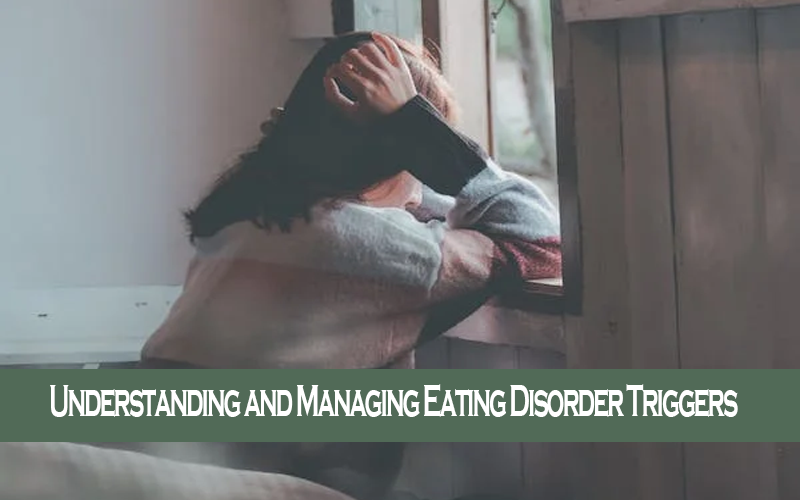Eating disorders are complex mental health conditions characterized by unhealthy eating patterns. An eating disorder can have severe physical and emotional consequences. One aspect of managing eating disorders is recognizing and addressing triggers. In this case, triggers are factors that contribute to the development or exacerbation of disordered eating behaviors.
Types of Eating Disorders
Anorexia Nervosa: Characterized by extreme restriction of food intake, intense fear of gaining weight, and a distorted body image.
Bulimia Nervosa: Involves recurrent episodes of binge eating followed by compensatory behaviors such as purging (vomiting) or excessive exercise.
Binge-Eating Disorder: Involves frequent episodes of consuming large amounts of food without compensatory behaviors.
Avoidant/Restrictive Food Intake Disorder (ARFID): Characterized by a limited range of food choices, often related to sensory issues, rather than concerns about weight or body image.
Other Specified Feeding or Eating Disorder (OSFED): Encompasses eating disorders that do not meet the specific criteria for the disorders mentioned above.
Common Triggers for Eating Disorders
Social and Peer Pressure
This can come in various forms. It could be negative comments or comparisons to others' bodies. People may feel pressure to conform to certain beauty standards or body ideals. Social events that are centered around food can also induce anxiety.
Emotional Factors
Stress, anxiety, and depression can lead to emotional eating or restrictive eating as a coping mechanism. Trauma, including childhood abuse or neglect, can contribute to the development of eating disorders.
Body Image Issues
Perceived flaws or dissatisfaction with one's body can lead to restrictive eating or excessive exercise. This can be worsened by continued exposure to unrealistic beauty standards in social media, media, and advertising.
Dieting and Weight Loss Culture
Dieting and weight loss programs can promote unhealthy eating behavior, habits, and goals. Fad diets that promise quick results may lead to extreme restriction and binge eating.
Family Dynamics
A family history of eating disorders or dysfunctional eating patterns can increase vulnerability. Another factor is pressure from family members to lose weight or adhere to specific dietary habits.
Personal History
Prior experience with dieting, especially at a young age, can set the stage for disordered eating. Weight-related teasing or bullying in childhood can leave lasting emotional scars.
Perfectionism
The pursuit of perfection in various aspects of life, including appearance, can contribute to unhealthy attitudes towards food and eating.
Traumatic Life Events
Loss, divorce, or major life changes can trigger emotional distress, leading to disordered eating as a coping mechanism.
The Impact of an Eating Disorder
1. Physical Health:
- Severe weight loss or gain.
- Nutritional deficiencies.
- Digestive problems.
- Cardiovascular issues.
- Weakening of bones (osteoporosis).
2. Emotional and Psychological Health:
- Increased anxiety and depression.
- Low self-esteem and negative body image.
- Social isolation.
- Obsessive thoughts about food, weight, and appearance.
- Reduced quality of life.
3. Social and Interpersonal Consequences:
- Strained relationships with friends and family.
- Difficulty engaging in social activities that involve food.
- Isolation from social circles to hide disordered eating behavior.
To manage an eating disorder and the related triggers, consider seeking professional help. Start by consulting with a healthcare provider, therapist, or psychiatrist who specializes in eating disorders. A treatment plan tailored to your specific needs and triggers can make a significant difference in recovery. Eating disorder therapy is a collaborative effort between your therapist, doctor, and dietician. It can help you identify your personal triggers and learn strategies for coping with your triggers.
If you or someone you know is facing challenges related to an eating disorder, do not hesitate to seek help and support from healthcare professionals and loved ones. Trust Mental Health has a team of BIPOC therapists that offer eating disorder therapy in California. Contact us for a free 15 minute consultation. We will match you with a therapist best suited to your needs.
FAQs
What are the most common types of eating disorders?
The most common eating disorders include anorexia nervosa (severe food restriction and fear of weight gain), bulimia nervosa (binge eating followed by purging), and binge-eating disorder (frequent episodes of overeating without purging).
What causes eating disorders?
Eating disorders can have various causes, including genetic factors, psychological and emotional factors, societal pressures related to body image, dieting, and trauma. They often result from a combination of these factors.
Are eating disorders only about food and body image?
Eating disorders are complex and involve both physical and psychological aspects. They often reflect deeper emotional and mental health issues, such as anxiety, depression, and low self-esteem.




.jpg)

Comments